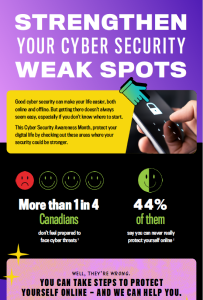
Good cyber security can make your life easier, both online and offline. But getting there doesn't always seem easy, especially if you don't know where to start.
This Cyber Security Awareness Month, protect your digital life by checking out these areas where your security could be stronger.
More than 1 in 4 Canadians don't feel prepared to face cyber threats i
44% of them say you can never really protect yourself online i
Well, they're wrong.
You can take steps to protect yourself online - and we can help you.
Are your passwords keeping you protected?
Having a strong password is one of the most important ways to improve your cyber security. If you don't have a unique and complex one (for each account), your putting your data at risk.
30% of Canadians don't use complex passwords i
41% of Canadians use the same password for multiple accounts i
Don't do that.
Instead, strengthen your password game
Use unique passphrases and/or passwords with letters, numbers and special characters
Store your complex passwords and passphrases in a password manager
Never share them with anyone else
Is your cyber security shallow?
Good cyber security has layers - of authentication, that is! Especially for your most sensitive accounts, like ones with financial or personally identifying information.
53% of Canadians use multi-factor authentication, also known as MFA i
79% of Canadians receive security codes by text message, also known as SMS i
Though it's only one layer of your cyber security, it's a big one! MFA can block up to 99.9 % of attacks on your accounts. iiiii
If MFA is not enabled on your accounts, minimize this window and do it right now
Are you sending the right message?
Texting and emailing are great ways to stay in touch with the people and things we love. But they can also open the door to unexpected threats.
Only 44% of Canadians have researched how to tell if an email is a scam i
And yet...
76% are concerned about identity theft i
29% are concerned about phishing scams i
26% have been victimized by an email scam i
Know how to spot a scam so you can message safely.
Look out for:
- Urgent or threatening language
- Unusual requests for sensitive information
- Spelling or grammar errors and unprofessional graphics
Get more tips to secure your accounts and devices at GetCyberSafe.ca
